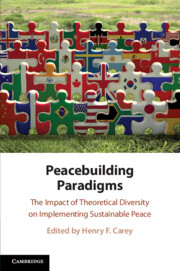Book contents
- Peacebuilding Paradigms
- Peacebuilding Paradigms
- Copyright page
- Contents
- Figures
- Tables
- Contributors
- Foreword
- Introduction Bridging the Conceptual and Theoretical Divides on Peace and Peacebuilding
- Part I The Realist Paradigm
- Part II The Liberal Paradigm
- Part III The Constructivist Paradigm
- 6 The Social Construction of Peacebuilding
- 7 Generations of Constructing Peace
- Part IV The Cosmopolitan Paradigm
- Part V The Critical Theory Paradigm
- Part VI The Locality Paradigm
- Part VII The Policy Paradigm
- Bibliography
- Index
6 - The Social Construction of Peacebuilding
from Part III - The Constructivist Paradigm
Published online by Cambridge University Press: 16 December 2020
- Peacebuilding Paradigms
- Peacebuilding Paradigms
- Copyright page
- Contents
- Figures
- Tables
- Contributors
- Foreword
- Introduction Bridging the Conceptual and Theoretical Divides on Peace and Peacebuilding
- Part I The Realist Paradigm
- Part II The Liberal Paradigm
- Part III The Constructivist Paradigm
- 6 The Social Construction of Peacebuilding
- 7 Generations of Constructing Peace
- Part IV The Cosmopolitan Paradigm
- Part V The Critical Theory Paradigm
- Part VI The Locality Paradigm
- Part VII The Policy Paradigm
- Bibliography
- Index
Summary
This chapter examines how the situating of individuals and states in societal contexts holds implications for understanding the causes conflict and the generation of peace. It challenges the strict agent-centered state-centricity of traditionalist approaches and looks at the roles played by different societal constraints, norms, and processes at the international and domestic levels.I provide a discussion of the core assumptions of social constructivism andcompare social constructivism’s approach to peace with the other major paradigms (and their subparadigms) assessed in this book. Iconsider how the rational default mechanisms of security studies and the realist or power political paradigms, which have dominated the discourse for much of the period of scientific study, have come to be critiqued. This will be followed by detailed discussion of the similarities and differences between social constructivism and liberal approaches, functionalism, English School rationalism, critical approaches, and cosmopolitanism. I assess the contribution of social constructivismto the transformation of conflictual relations between states and the social construction of peace.
Keywords
- Type
- Chapter
- Information
- Peacebuilding ParadigmsThe Impact of Theoretical Diversity on Implementing Sustainable Peace, pp. 111 - 125Publisher: Cambridge University PressPrint publication year: 2020
- 1
- Cited by



